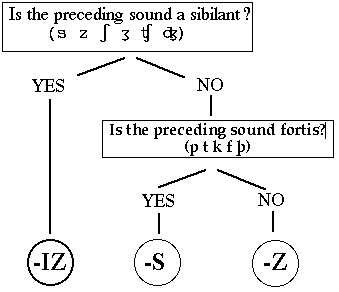 back to course outline
back to course outline
S: Spelling and Pronunciation 
In order to work out whether the sound is S or Z, you have first to ask:
- Is it an inflection or not?
Remember, by "inflection" we mean any of the following:
loves( 3rd. person singular present of the verb:'She loves Selfoss' )
cats (plural)
John's (possessive)
the girls' (plural possessive)
's = is (Mary's leaving)
's = has (Mary's gone)
If it's an inflection, go to  INFLECTIONAL -S
INFLECTIONAL -S
If not, go to  LEXICAL -S
LEXICAL -S
 INFLECTIONAL -S
INFLECTIONAL -S
First, FIND THE SOUND IMMEDIATELY PRECEDING THE INFLECTION.
For example: - loves /



 / - the preceding sound is the lenis fricative
/ - the preceding sound is the lenis fricative  .
.
- wants /




 / - the preceding sound is the fortis plosive
/ - the preceding sound is the fortis plosive 
- sees /


 / - the preceding sound is the vowel
/ - the preceding sound is the vowel 
- voices /




 / - here the ending is -
/ - here the ending is -
 . (This means that some speakers have -
. (This means that some speakers have -
 , and others have -
, and others have -
 ). - The sound immediately preceding the ending is
). - The sound immediately preceding the ending is  .
.
As we can see, there are 3 possible endings:
- -

 after SIBILANTS
or s-sounds (voices, watches, dishes, barges, the Jones's, Magnus's, buses)
after SIBILANTS
or s-sounds (voices, watches, dishes, barges, the Jones's, Magnus's, buses)
- -
 after FORTIS CONSONANTS (other than sibilants) - i.e. after
after FORTIS CONSONANTS (other than sibilants) - i.e. after  ,
, 
 ,
,  ,
,  (tops, Dick's, rats, laughs, paths)
(tops, Dick's, rats, laughs, paths)
- -
 after EVERYTHING ELSE (all other consonants and all vowels) - (robs, hugs, spades, trees, leaves, bathes, Joe's, Ann's, things, ends, he's, she's, cars, spiders...)
after EVERYTHING ELSE (all other consonants and all vowels) - (robs, hugs, spades, trees, leaves, bathes, Joe's, Ann's, things, ends, he's, she's, cars, spiders...)
We can show this diagramatically:

You can also find this information in Wells's (




 ) Longmans Pronunciation Dictionary under "-s, -es", p.666 (p.615 in older editions)
) Longmans Pronunciation Dictionary under "-s, -es", p.666 (p.615 in older editions)
Back to top 
 LEXICAL S
LEXICAL S
When s is not inflectional, when it is part of the word, and so "lexical", it's not always so easy to work out the pronunciation. - We'll also consider the other sibilant SPELLING FORMS under this section - z, c, ss, ti and so on.
There are a few rules which will help us, but much of the time you'll need to consult a dictionary. Most of these rules seem to work fairly well:
- 's' at the beginning of words is pronounced /s/ (unvoiced) - see, stop, Sue.
- 's' at the end of words, when it is not inflectional, is usually /s/ (unvoiced) - crisis, curious, Magnus, us (but 'as' has /z/). In 'has' and 'does' the -s is inflectional, and voiced -


 ,
, 

 .
.
- 'z' is always voiced /z/ - zoo, zink, prize, crazy, buzz, quiz. But 'tz' is /ts/ - waltz /




 /, Ritz /
/, Ritz /


 /
/
- 'c' before 'e', 'i', 'y' is always /s/: price, voice, cellar, cylinder, recite.
- 'ss' is usually /s/ (unvoiced) - kiss, kissing, fusser, lesson, massive -- but not always! For instance, 'dessert' (= sweet course at the end of a meal) is pronounces like the verb 'to desert', both with z and the accent on the second syllable - /





 / (but the noun 'desert' has the accent on the first syllable: /
/ (but the noun 'desert' has the accent on the first syllable: /




 /.) - Other exceptions are 'possess' /
/.) - Other exceptions are 'possess' /




 /, 'scissors' /
/, 'scissors' /




 /, 'dissolve' /
/, 'dissolve' /





 / (like resolve' /
/ (like resolve' /





 /) - but compare 'dissolution'/
/) - but compare 'dissolution'/








 /.
/.
- 'ss' is pronounced /
 / (unvoiced) inwords like pressure', /
/ (unvoiced) inwords like pressure', /




 /.
/.
- 'ssi' and 'ti' are pronounced /
 / (unvoiced) in words like 'mission' /
/ (unvoiced) in words like 'mission' /




 /, 'nation /
/, 'nation /




 / - note the 'i' is silent.
/ - note the 'i' is silent.
- 'si' and 'su' are pronounced /
 / (voiced) in words like 'vision' /
/ (voiced) in words like 'vision' /




 /, 'pleasure' /
/, 'pleasure' /




 /.
/.
But these rules only cover a small number of -s- words. Most of the time, when s occurs in the middle of words, there ae either no rules or they are so complicated that it may simply be better to learn the word. Look it up in a dictionary!
 Here is the handout on S-spelling for the 6th week; answers will go up after the 6th week.
Here is the handout on S-spelling for the 6th week; answers will go up after the 6th week.
 See also 'S - Spelling-to-sound' in LPD.
See also 'S - Spelling-to-sound' in LPD.
Back to top 
 back to course outline
back to course outline
 back to Phonetics
back to Phonetics
 back to Pétur Knútsson's home page
back to Pétur Knútsson's home page
If you have any questions mail me at peturk@hi.is.
![]() LEXICAL -S
LEXICAL -S
![]() See also 'S - Spelling-to-sound' in LPD.
See also 'S - Spelling-to-sound' in LPD.